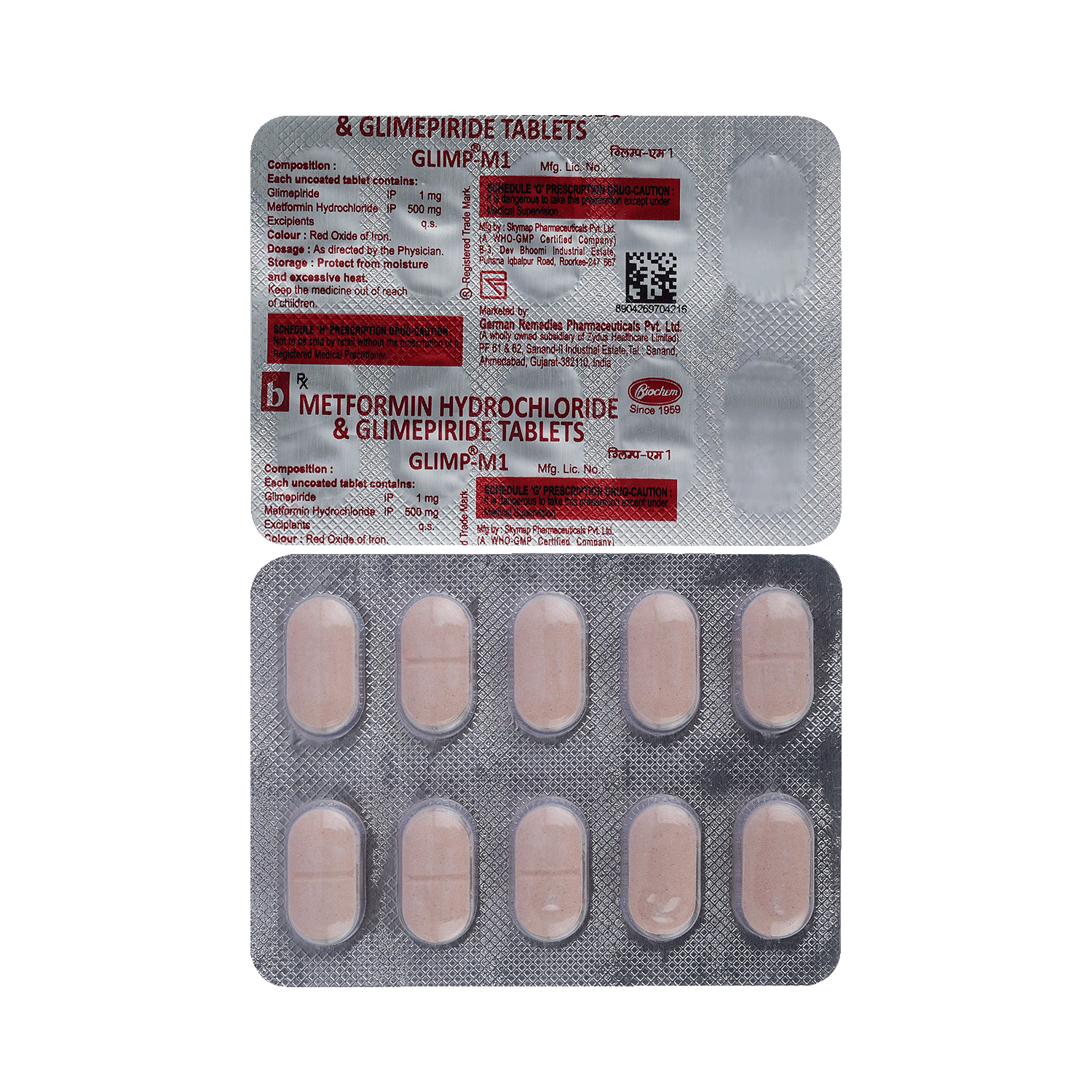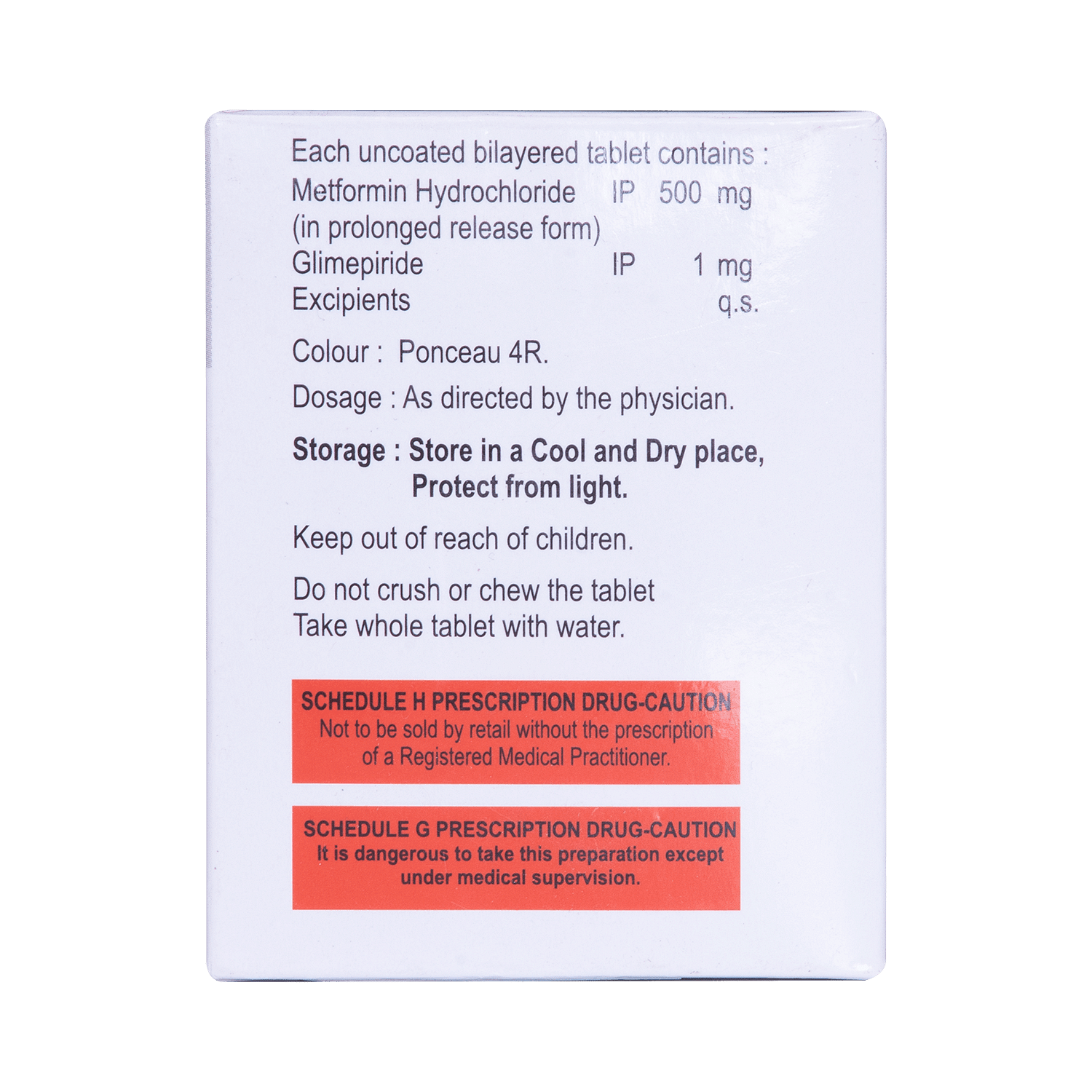
Glimefide M Tablet
Manufacturer
Fidelity Lifesciences Pvt Ltd
Salt Composition
Glimepiride (1mg) + Metformin (500mg)
Key Information
Short Description
Glimefide M Tablet is a combination of two medicines used to treat type 2 diabetes mellitus in adults. It helps control blood sugar levels in people with diabetes.
Dosage Form
Tablet
Introduction
Glimefide M Tablet belongs to a category of medicines known as anti-diabetic drugs. It is a combination of two medicines used to treat type 2 diabetes mellitus in adults. It helps control blood sugar levels in people with diabetes.
Directions for Use
Take this medicine in the dose and duration as advised by your doctor. Swallow it as a whole. Do not chew, crush or break it. Glimefide M Tablet is to be taken with food.
Safety Information
Side Effects
It can cause hypoglycemia (low blood sugar level) when used with other antidiabetic medicines, alcohol or if you delay or miss a meal.
Alcohol Warning
It is unsafe to consume alcohol with Glimefide M Tablet.
Breastfeeding Warning
Glimefide M Tablet is unsafe to use during breastfeeding. Data suggests that the drug may cause toxicity to the baby.
Pregnancy Warning
Glimefide M Tablet may be unsafe to use during pregnancy. Although there are limited studies in humans, animal studies have shown harmful effects on the developing baby. Your doctor will weigh the benefits and any potential risks before prescribing it to you. Please consult your doctor.
How it works
Glimefide M Tablet is a combination of two antidiabetic medicines: Glimepiride and Metformin. Glimepiride is a sulfonylurea which works by increasing the amount of insulin released by the pancreas in order to lower the blood glucose. Metformin is a biguanide which works by lowering glucose production in the liver, delaying glucose absorption from intestines and increasing the body's sensitivity to insulin.
Quick Tips
Take it with food to lower your chance of having an upset stomach. Monitor your blood sugar level regularly while you are taking this medicine. Inform your doctor about your diabetes treatment if you are due to have surgery under a general anesthetic. Tell your doctor immediately if you experience any deep or rapid breathing or if you have persistent nausea, vomiting, and stomach pain as Glimefide M Tablet may cause a rare but serious condition called lactic acidosis which is an excess of lactic acid in the blood.
Related Medicines

Glimp-M 1 Tablet

Glimfirst M1 Tablet

Metffil G1 Tablet

Glimcan M 1mg/500mg Tablet

Glycostar M 1mg/500mg Tablet

Dialim M 1mg/500mg Tablet

Glimpy-MF 1 Tablet

Glycosun M 1mg/500mg Tablet

Gofin G 1mg/500mg Tablet

Glimhold M 1mg/500mg Tablet
Frequently asked questions
What are the recommended storage conditions for Glimefide M Tablet?
Store this medicine in its original container or pack, tightly closed. Follow the instructions on the packaging label regarding storage and disposal. Ensure that it is not accessible to pets, children, or other individuals.
Can the use of Glimefide M Tablet lead to lactic acidosis?
Yes, the use of Glimefide M Tablet can lead to lactic acidosis. This condition is characterized by a build-up of lactic acid in the bloodstream and is known as MALA (Metformin-associated Lactic Acidosis). It's a rare side effect associated with metformin use, making it particularly important for patients with pre-existing kidney conditions, older age, or those who consume alcohol heavily. Symptoms of lactic acidosis may include muscle pain or weakness, dizziness, fatigue, cold extremities, breathing difficulties, nausea, vomiting, stomach discomfort, or an irregular heart rate. If you experience any of these symptoms while taking Glimefide M Tablet, stop the medication and consult your doctor immediately.
What is Glimefide M Tablet?
Glimefide M Tablet is a combination of two medications: Glimepiride and Metformin. It's used to treat type 2 diabetes mellitus (DM). This medicine improves blood glucose levels in adults when taken alongside proper diet and exercise. Glimepiride enhances insulin release from the pancreas, while Metformin reduces glucose production in the liver and boosts insulin sensitivity. This combination is not indicated for type 1 DM treatment.
What are the possible side effects of Glimefide M Tablet?
Glimefide M Tablet can cause common side effects like hypoglycemia (low blood sugar level), altered taste, nausea, stomach pain, diarrhea, and headaches. It may also lead to serious but rare side effects such as lactic acidosis. Long-term use can also increase the risk of Vitamin B12 deficiency.
Can the use of Glimefide M Tablet lead to Vitamin B12 deficiency?
Yes, long-term use of Glimefide M Tablet can lead to a deficiency in Vitamin B12. This occurs because the medication interferes with vitamin B12 absorption in the stomach. Untreated, it may result in anemia and nerve problems like tingling or numbness in the hands and feet, weakness, urinary issues, changes in mental status, and difficulty maintaining balance (ataxia). To prevent this, consider supplementing with Vitamin B12 from outside sources at least once a year.
Can the use of Glimefide M Tablet cause hypoglycemia?
Yes, the use of Glimefide M Tablet can cause hypoglycemia (low blood sugar level). This often manifests as nausea, headache, irritability, hunger, sweating, dizziness, fast heart rate, and anxiety or shakiness. It's more likely to occur if you miss meals, consume alcohol, overexert yourself, or combine this medication with other diabetes medications. Regular blood sugar monitoring is crucial for managing hypoglycemia.
Is it safe to take alcohol while I am also taking Glimefide M Tablet?
No, alcohol should not be consumed when taking Glimefide M Tablet as it can lead to a decrease in blood sugar and increase the likelihood of hypoglycemia. It might also raise your risk for lactic acidosis.


